实用英语综合教程Unippliyingforb教案
实用英语综合教程第三版第3册教学设计
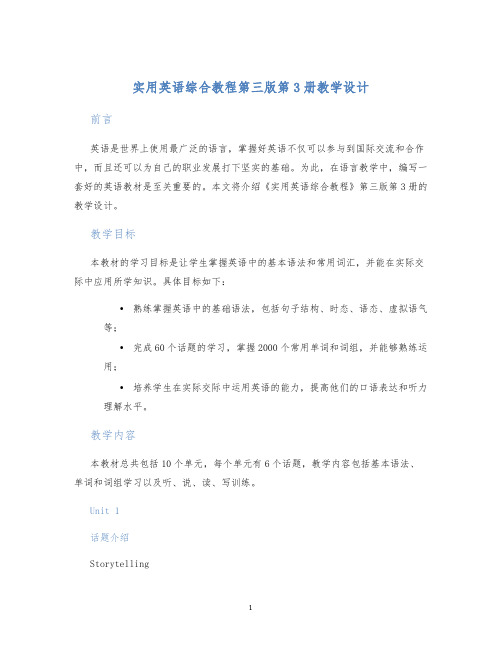
实用英语综合教程第三版第3册教学设计前言英语是世界上使用最广泛的语言,掌握好英语不仅可以参与到国际交流和合作中,而且还可以为自己的职业发展打下坚实的基础。
为此,在语言教学中,编写一套好的英语教材是至关重要的。
本文将介绍《实用英语综合教程》第三版第3册的教学设计。
教学目标本教材的学习目标是让学生掌握英语中的基本语法和常用词汇,并能在实际交际中应用所学知识。
具体目标如下:•熟练掌握英语中的基础语法,包括句子结构、时态、语态、虚拟语气等;•完成60个话题的学习,掌握2000个常用单词和词组,并能够熟练运用;•培养学生在实际交际中运用英语的能力,提高他们的口语表达和听力理解水平。
教学内容本教材总共包括10个单元,每个单元有6个话题,教学内容包括基本语法、单词和词组学习以及听、说、读、写训练。
Unit 1话题介绍Storytelling学习重点时间状语从句、宾语从句、定语从句的使用和区别;复习练习基本的单词拼写和语法知识。
学习方法1.阅读教材中的相关内容;2.完成教材中的练习题;3.利用学习软件进行单词和语法知识练习。
教学成果学生能够熟练掌握时间状语从句、宾语从句、定语从句的使用和区别,准确运用单词拼写和语法知识。
Unit 2…教学评估为了评估教学效果,需要设置一系列教学评估方法,以确保教学目标的完成度。
具体评估方法包括:1.定期进行听说读写测试,以了解学生的英语水平及进度;2.课堂表现评估,对学生的课堂参与、听讲、互动等方面进行评估;3.考试评估,使用考试方式对学生进行全面测试。
教学反思教学过程中需要反思自己的教学方法、教材内容、学生学习情况等,及时调整教学进度和教学方法,以提升教学效果。
总结《实用英语综合教程》第三版第3册是一套适用于大学英语教学的教材,通过对基础语法和常用词汇的学习,培养学生运用英语的能力,提高他们的口语表达和听力理解水平。
在教学中,需要制定合理的教学目标和教学方法,并通过多种评估方式对学生进行评估,及时调整教学进度和教学方法。
实用综合教程教案Unit
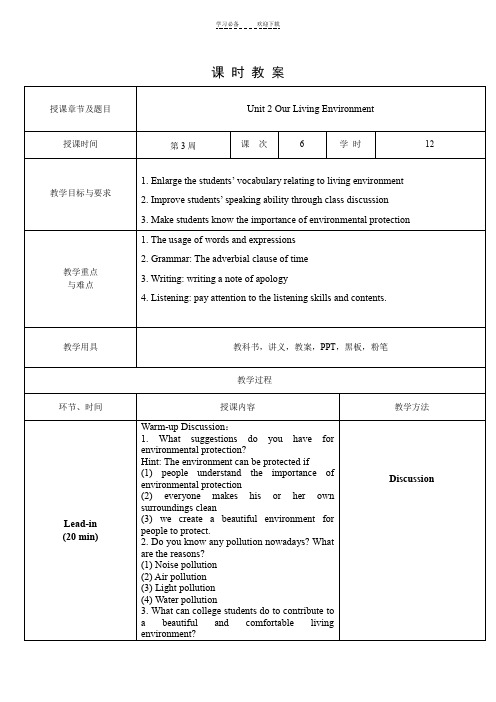
2. Do you know any pollution nowadays? What are the reasons?
(1) Noise pollution
(2) Air pollution
(3) Light pollution
(4) Water pollution
3. What can college students do to contribute to a beautiful and comfortable living environment?
Discussion
Background information
e.g. The tape is not very sticky.这个胶带不是很粘。
Stick v.粘住,坚持,困住,使为难
7.stuff n.材料v.填充,塞满,塞住
e.g. 1) green / garden stuff蔬菜
“White pollution” results from a combination of factors, including China’s fast consumption patterns. Promoting people’s environmental consciousness should be give importance. The more they know about how severe “white pollution” is, the more voluntarily they will help address the problem.
课时教案
实用英语综合教程教案

实用英语综合教程教案教案标题:实用英语综合教程教案教案目标:1. 帮助学生掌握实用英语的基本词汇和语法知识。
2. 培养学生的听、说、读、写能力,提高他们的语言应用能力。
3. 培养学生的跨文化交际能力,增加他们对英语国家文化的了解。
教学内容:本教案针对实用英语综合教程,包括以下主题:1. 日常生活用语:问候、介绍、购物、饮食等。
2. 旅行与交通:预订酒店、乘坐公共交通工具、问路等。
3. 工作与职业:面试、工作技巧、职业规划等。
4. 社交与文化:参加社交活动、文化差异、习俗等。
教学步骤:1. 导入:通过引入与主题相关的图片、视频或小故事,激发学生的兴趣,引发他们对主题的思考。
2. 词汇与语法讲解:根据每个主题的内容,介绍相关的词汇和语法知识,并通过例句和练习帮助学生理解和掌握。
3. 听力训练:播放与主题相关的听力材料,要求学生听懂关键信息,并回答问题或完成任务。
4. 口语练习:通过角色扮演、对话练习等形式,让学生运用所学知识进行口语交流,提高他们的口语表达能力。
5. 阅读与写作:提供与主题相关的阅读材料,要求学生阅读并回答问题或写一篇短文,锻炼他们的阅读理解和写作能力。
6. 文化交流:通过介绍英语国家的文化习俗、音乐、电影等,增加学生对英语国家文化的了解,培养他们的跨文化交际能力。
7. 综合练习:设计综合性的练习,包括听、说、读、写等多个方面,让学生综合运用所学知识,提高他们的语言应用能力。
8. 总结与反馈:对本节课的学习进行总结,并给予学生反馈,鼓励他们的努力并指出需要改进的地方。
教学评估:1. 课堂表现:观察学生在课堂上的参与度、表达能力和合作精神。
2. 作业评估:批改学生的书面作业,评估他们的语法和写作能力。
3. 测验:设计与教学内容相关的听力、口语、阅读和写作测验,评估学生的综合语言能力。
教学资源:1. 教材:实用英语综合教程教材及配套练习册。
2. 多媒体设备:投影仪、音响设备等,用于播放听力材料和展示教学资源。
实用英语综合教程第二册教案
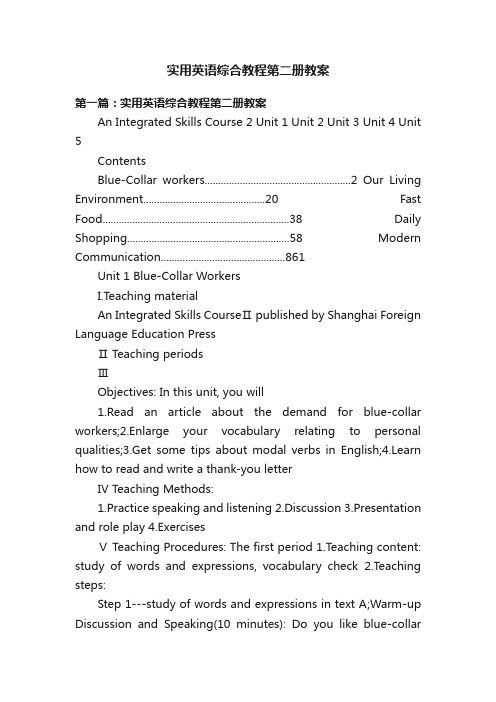
实用英语综合教程第二册教案第一篇:实用英语综合教程第二册教案An Integrated Skills Course 2 Unit 1 Unit 2 Unit 3 Unit 4 Unit 5ContentsBlue-Collar workers......................................................2 Our Living Environment.............................................20 Fast Food.....................................................................38 Daily Shopping............................................................58 Modern Communication. (861)Unit 1 Blue-Collar WorkersI.Teaching materialAn Integrated Skills CourseⅡ published by Shanghai Foreign Language Education PressⅡ Teaching periodsⅢObjectives: In this unit, you will1.Read an article about the demand for blue-collar workers;2.Enlarge your vocabulary relating to personal qualities;3.Get some tips about modal verbs in English;4.Learn how to read and write a thank-you letterⅣ Teaching Methods:1.Practice speaking and listening2.Discussion3.Presentation and role play4.ExercisesⅤ Teaching Procedures: The first period 1.Teaching content: study of words and expressions, vocabulary check 2.Teaching steps:Step 1---study of words and expressions in text A;Warm-up Discussion and Speaking(10 minutes): Do you like blue-collarjobs? What is your favorite blue-collar job and why?Hints: I like blue-collar jobs because(1)the demand is huge;(2)you can get professional training and technical knowledge;(3)the salary is goodMy favorite blue-collar job is that of a gardener, because(1)I can work outdoors and enjoy the fresh air;and(2)I can keep fit and get good pay(The students will probably have trouble with English expressions relating to blue-collar jobs.The teacher may allow the students to answer this question in Chinese, and then give the students key terms in English and ask them to express their ideas again in English.)Background Information(5 minutes)Blue-collar workers(TB P2)Different categories of jobs(blue-collar/golden-collar/pink-collar/grey-collar/white-collar)Introduce new words on board:(20 minutes)heartland resident workforcereplacementreplaceshortage manufacturermanufacture remarkable recoveryannualearnings earnpoint togap high-end decline expand certificateprograminvestmentinvest find a way upStep 2—Practice: Vocabulary Check and Oral English(10 minutes)Give students 5 minutes to finish exercises A in Page 9Everyday English 1.If you want to stop someone and ask him/her for directions, what do you usually say to him/her first?(Excuse me.)2.If you don’t quite understand what the person has told you about the directions, what can you do?(Although one can always say “I beg you pardon?” or “Could you say it again?” try not to make the person repeat more than twice.Instead, you may repeat what you’ve already understood and let the person tell you the test.)3.While traveling in a foreign country, what would you bring along to make your travel easier?(A road map.)The second period 1.Teaching content: Discussion and Comprehensive of Text A 2.Teaching steps:Step 1---Warm up(10 minutes)(invite some students to explain the meaning of the difficult sentences of the text A in English or in Chinese, teacher may give them some hints.) Step2---Language Points(25 minutes)1)To many… offer its residen ts: For many people, America’s industrial heartland can’t provide enough work to its residents.too little: not too much, not enough 太少Too much work and too little rest often lead to illness.过量的工作和过少的休息会引起疾病。
新编实用英语综合教程教案

新编实用英语综合教程教案课程名称:新编实用英语综合教程授课人:XXX课程时长:XX学时教学目标:1. 增强学生的英语语言应用能力,特别是听说能力。
2. 培养学生的跨文化交际意识,提高跨文化交际能力。
3. 拓宽学生的国际视野,增强国际竞争力。
教学内容:1. 英语基础知识:词汇、语法、语音等。
2. 实用英语应用:商务英语、旅游英语、酒店英语等。
3. 跨文化交际:文化差异、跨文化沟通技巧等。
教学难点与重点:难点:如何将英语基础知识与实际应用有效结合,提高学生的英语应用能力。
重点:跨文化交际能力的培养,以及如何增强学生的国际竞争力。
教具和多媒体资源:1. 投影仪、电脑、音响等多媒体设备。
2. 英语教材、练习册、听力材料等。
3. 跨文化交际案例、图片、视频等教学资源。
教学方法:1. 讲授法:讲授英语基础知识,如词汇、语法、语音等。
2. 案例分析法:通过分析实际案例,让学生了解跨文化交际的实际情况。
3. 小组讨论法:组织学生进行小组讨论,提高口语表达和交流能力。
4. 角色扮演法:通过角色扮演,模拟实际场景,提高学生的英语应用能力。
教学过程:1. 导入(5分钟):通过提问导入,检查学生预习情况,引起学生的兴趣。
2. 讲授新课(45分钟):讲解英语基础知识和实用英语应用,结合案例分析,引导学生思考。
3. 巩固练习(20分钟):组织学生进行小组讨论、角色扮演等活动,巩固所学内容。
4. 归纳小结(10分钟):总结本节课的重点内容,对学生的表现进行评价,给出建议和指导。
评价与反馈:1. 设计评价策略:通过课堂表现、小组讨论、角色扮演等活动,以及课后作业和测试等形式进行评价。
实用大学英语综合教程教案
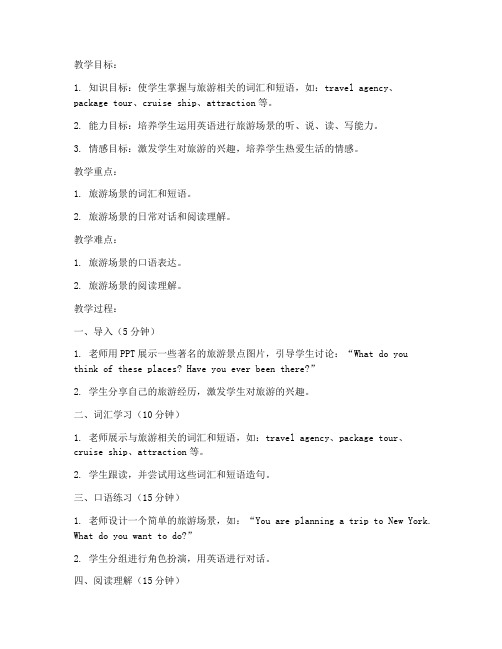
教学目标:1. 知识目标:使学生掌握与旅游相关的词汇和短语,如:travel agency、package tour、cruise ship、attraction等。
2. 能力目标:培养学生运用英语进行旅游场景的听、说、读、写能力。
3. 情感目标:激发学生对旅游的兴趣,培养学生热爱生活的情感。
教学重点:1. 旅游场景的词汇和短语。
2. 旅游场景的日常对话和阅读理解。
教学难点:1. 旅游场景的口语表达。
2. 旅游场景的阅读理解。
教学过程:一、导入(5分钟)1. 老师用PPT展示一些著名的旅游景点图片,引导学生讨论:“What do youthink of these places? Have you ever been there?”2. 学生分享自己的旅游经历,激发学生对旅游的兴趣。
二、词汇学习(10分钟)1. 老师展示与旅游相关的词汇和短语,如:travel agency、package tour、cruise ship、attraction等。
2. 学生跟读,并尝试用这些词汇和短语造句。
三、口语练习(15分钟)1. 老师设计一个简单的旅游场景,如:“You are planning a trip to New York. What do you want to do?”2. 学生分组进行角色扮演,用英语进行对话。
四、阅读理解(15分钟)1. 老师分发课文,让学生阅读并完成课后练习。
2. 老师讲解课文中的难点,如:旅游相关的词汇和短语、旅游场景的日常对话等。
五、写作练习(10分钟)1. 老师布置写作任务:写一篇关于自己旅游经历的短文。
2. 学生根据提示,用英语进行写作。
六、课堂小结(5分钟)1. 老师总结本节课所学内容,强调重点和难点。
2. 学生分享自己的学习心得。
七、课后作业1. 复习课文,巩固所学词汇和短语。
2. 完成课后练习,提高阅读理解能力。
3. 根据写作任务,写一篇关于自己旅游经历的短文。
新编实用英语综合教程2 -Unit 8 Appliying for a job教案
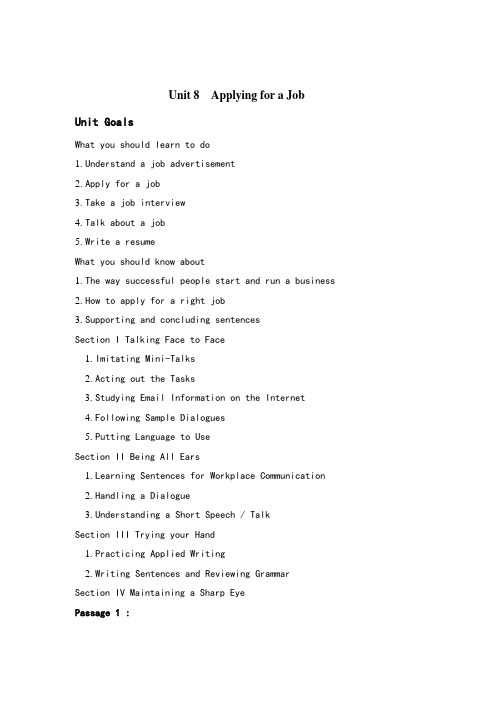
Unit 8 Applying for a JobUnit GoalsWhat you should learn to do1.Understand a job advertisement2.Apply for a job3.Take a job interview4.Talk about a job5.Write a resumeWhat you should know about1.The way successful people start and run a business2.How to apply for a right job3.Supporting and concluding sentencesSection I Talking Face to Face1.Imitating Mini-Talks2.Acting out the Tasks3.Studying Email Information on the Internet4.Following Sample Dialogues5.Putting Language to UseSection II Being All Ears1.Learning Sentences for Workplace Communication2.Handling a Dialogue3.Understanding a Short Speech / TalkSection III Trying your Hand1.Practicing Applied Writing2.Writing Sentences and Reviewing GrammarSection IV Maintaining a Sharp EyePassage 1 :Text Applying for a New BossWhen I went off to college, I got one piece of advice from my father: “It doesn’t matter what courses you take, just find the great professors.” Sure enough, I soon discovered that all kinds of subjects were interesting to me as long as good teachers presented them. In Professor Weinstein’s class, I could hear the tumbrels rolling through the streets of Paris during the French Revolution. And going back further, I can still recall things about the stars that I should have long ago forgotten if not for mysecond-grade teacher, Miss Scorchiotti. To me, a great teacher is one who performs a subject in a way that makes it come alive.A great boss does the same. They turn the day-to-day uninteresting jobs into a learning experience. They convince you that you and what you are doing actually matter. They give you confidence, which makes you more willing to ask a question, or assume responsibility, or even suggest a change in some age-old company process. In short, a great boss knows how to teach.So my advice to anyone bound for the job market in the coming years and to anyone looking for a different work experience is: Don’t interview for the right job. Interview for the right boss. Not a best person, but someone who is willing and able to help you grow professionally.What are some signs of the wrong boss? Well, anyone who:● is surrounded by the same team year after year. If you’re such a good teacher, why aren’t these people moving on and getting promoted?● is short of a sense of humor. Life is short. Work is hard. Let’s lighten up when facing something difficult.● loves typing. Hates talking. Why are you emailing me when I sit across the hall?Who are the best bosses I ever had? Angela, my first boss out of college, was very clever and outspoken. She ruffled feathers around the company but was eager to let me in on what she thought and why.My boss Tom used to say: “You can sleep when you’re dead.” Working for Tom was just a bit exhausting. But he was also unbelievably straightforward, and quick to ask advice and give it. We often had different opinions, yet our discussions helped both of us learn more about what we were trying to perform. A great boss both gives respect and earns it.And how do you know when you’ve found the right boss? Be yourself with them and see if the self they are with you is someone you want to learn from for a couple of years. If that person is dull or dogmatic in an interview, guess what they’re going to be like Monday through Friday? Interviewees are on their best behavior in that setting, but so are interviewers. You don’t like what you see? The power is yours. Go out and interview another boss.Language Points1 Explanation of Difficult Sentences1. (Para. 1) And going back further, I can still recall things about the stars that I should have long ago forgotten if not for my second-grade teacher, Miss Scorchiotti ...Analysis: This is a complex sentence. That introduces a relative clause to modify the stars, followed by an if-clause of condition. Attention should be paid to the subjunctive mood used here: should have forgotten, ... with the latter part being an elliptical clause which can be assumed to be if it were not for ...Translation: 再早些,我仍然记得有关星体的知识,若不是由于我二年级的斯高奇奥迪老师,我早就将其忘光了。
新编实用英语综合教程2--Unit-8-Appliying-for-a-job教案
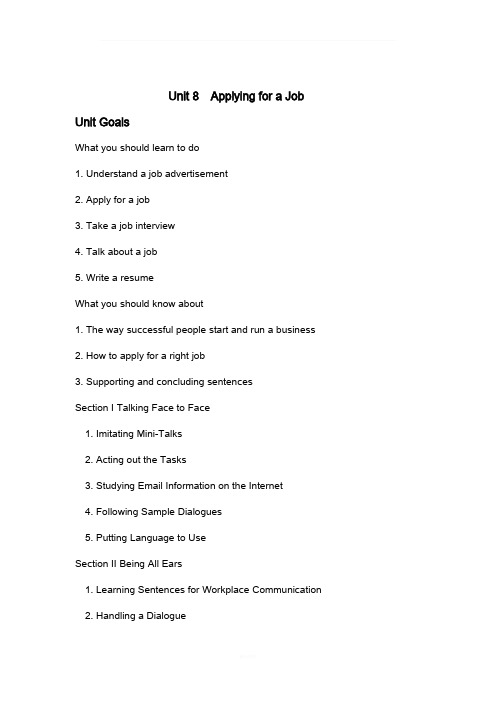
Unit 8 Applying for a Job Unit GoalsWhat you should learn to do1.Understand a job advertisement2.Apply for a job3.Take a job interview4.Talk about a job5.Write a resumeWhat you should know about1.The way successful people start and run a business2.How to apply for a right job3.Supporting and concluding sentencesSection I Talking Face to Face1.Imitating Mini-Talks2.Acting out the Tasks3.Studying Email Information on the Internet4.Following Sample Dialogues5.Putting Language to UseSection II Being All Ears1.Learning Sentences for Workplace Communication2.Handling a Dialogue3.Understanding a Short Speech / TalkSection III Trying your Hand1.Practicing Applied Writing2.Writing Sentences and Reviewing GrammarSection IV Maintaining a Sharp EyePassage 1 :Text Applying for a New BossWhen I went off to college, I got one piece of advice from my father: “It doesn’t matter what courses you take, just find the great professors.”Sure enough, I soon discovered that all kinds of subjects were interesting to me as long as good teachers presented them. In Professor Weinstein’s class, I could hear the tumbrels rolling through the streets of Paris during the French Revolution. And going back further, I can still recall things about the stars that I should have long ago forgotten if not for mysecond-grade teacher, Miss Scorchiotti. To me, a great teacher is one who performs a subject in a way that makes it come alive.A great boss does the same. They turn the day-to-day uninteresting jobs into a learning experience. They convince you that you and what you are doing actually matter. They give you confidence, which makes you more willing to ask a question, or assume responsibility, or even suggest a change in some age-old company process. In short, a great boss knows how to teach.So my advice to anyone bound for the job market in the coming years and to anyone looking for a different work experience is: Don’t interview for the right job. Interview for the right boss. Not a best person, but someone who is willing and able to help you grow professionally.What are some signs of the wrong boss? Well, anyone who:●is surrounded by the same team year after year. If you’re such a good teacher, why aren’t these people moving on and getting promoted?●is short of a sense of humor. Life is short. Work is hard. Let’s lighten up when facing something difficult.●loves typing. Hates talking. Why are you emailing me when I sit across the hall?Who are the best bosses I ever had? Angela, my first boss out of college, was very clever and outspoken. She ruffled feathers around the company but was eager to let me in on what she thought and why.My boss Tom used to say: “You can sleep when you’re dead.”Working for Tom was just a bit exhausting. But he was also unbelievably straightforward, and quick to ask advice and give it. We often had different opinions, yet our discussions helped both of us learn more about what we were trying to perform.A great boss both gives respect and earns it.And how do you know when you’ve found the right boss? Be yourself with them and see if the self they are with you is someone you want to learn fromfor a couple of years. If that person is dull or dogmatic in an interview, guess what they’re going to be like Monday through Friday? Interviewees are on their best behavior in that setting, but so are interviewers. You don’t like what you see? The power is yours. Go out and interview another boss.Language Points1 Explanation of Difficult Sentences1. (Para. 1) And going back further, I can still recall things about the stars that I should have long ago forgotten if not for my second-grade teacher, Miss Scorchiotti ...Analysis: This is a complex sentence. That introduces a relative clause to modify the stars, followed by an if-clause of condition. Attention should be paid to the subjunctive mood used here: should have forgotten, ... with the latter part being an elliptical clause which can be assumed to be if it were not for ... Translation: 再早些,我仍然记得有关星体的知识,若不是由于我二年级的斯高奇奥迪老师,我早就将其忘光了。
实用英语综合教程第2册教案(修改)
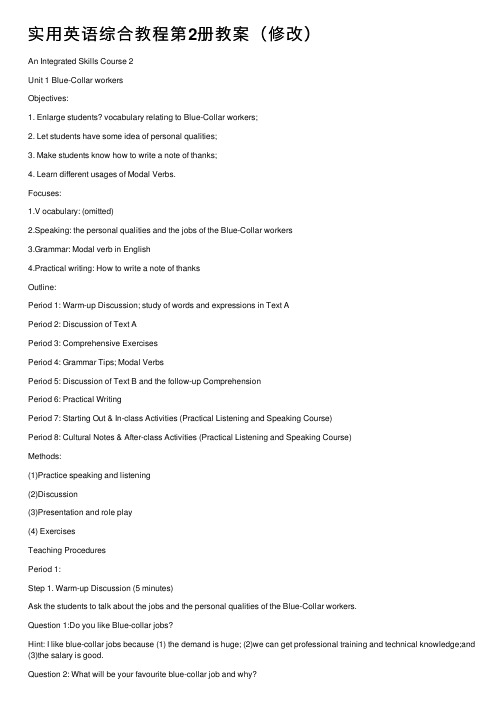
实⽤英语综合教程第2册教案(修改)An Integrated Skills Course 2Unit 1 Blue-Collar workersObjectives:1. Enlarge students? vocabulary relating to Blue-Collar workers;2. Let students have some idea of personal qualities;3. Make students know how to write a note of thanks;4. Learn different usages of Modal Verbs.Focuses:1.V ocabulary: (omitted)2.Speaking: the personal qualities and the jobs of the Blue-Collar workers3.Grammar: Modal verb in English4.Practical writing: How to write a note of thanksOutline:Period 1: Warm-up Discussion; study of words and expressions in Text APeriod 2: Discussion of Text APeriod 3: Comprehensive ExercisesPeriod 4: Grammar Tips; Modal VerbsPeriod 5: Discussion of Text B and the follow-up ComprehensionPeriod 6: Practical WritingPeriod 7: Starting Out & In-class Activities (Practical Listening and Speaking Course)Period 8: Cultural Notes & After-class Activities (Practical Listening and Speaking Course)Methods:(1)Practice speaking and listening(2)Discussion(3)Presentation and role play(4) ExercisesTeaching ProceduresPeriod 1:Step 1. Warm-up Discussion (5 minutes)Ask the students to talk about the jobs and the personal qualities of the Blue-Collar workers.Question 1:Do you like Blue-collar jobs?Hint: I like blue-collar jobs because (1) the demand is huge; (2)we can get professional training and technical knowledge;and (3)the salary is good.Question 2: What will be your favourite blue-collar job and why?Hint: My favourite blue-collar job is that of a gardener, because(1) I can work outdoors and enjoy the fresh air;and(2) I can keep fit and get good pay.A blue-collar worker is a member of the working class who performs manual labor. Blue-collar work may involve skilled or unskilled, manufacturing, mining, construction, mechanical, maintenance, technical installation and many other types of physical work. Blue-collar work is often paid hourly wage-labor, although some professionals may be paid by the project or salaried. There is a wide range of payscales for such work depending upon field of specialty and experience.White-collar workers typically perform work in an office environment and may involve sitting at a computer or desk. Service workers, or pink-collar workers, make up a third type of worker. Their labor is related to customer interaction, entertainment sales or other service-oriented work.Step 3. Vocabulary in Text A (20 minutes)Ask Ss to read new words and expressions by themselves and then read the new words together. Explain the important points.1. Heartland n.the area or region where a particular set of activities or beliefs is most significant 中⼼地区,⼼脏地带Jack hada six-day bus tour around the industrial heartland of America.杰克在美国⼯业中⼼区域乘⼤巴旅游了六天。
新编实用英语综合教程UnitAppliying for a job教案
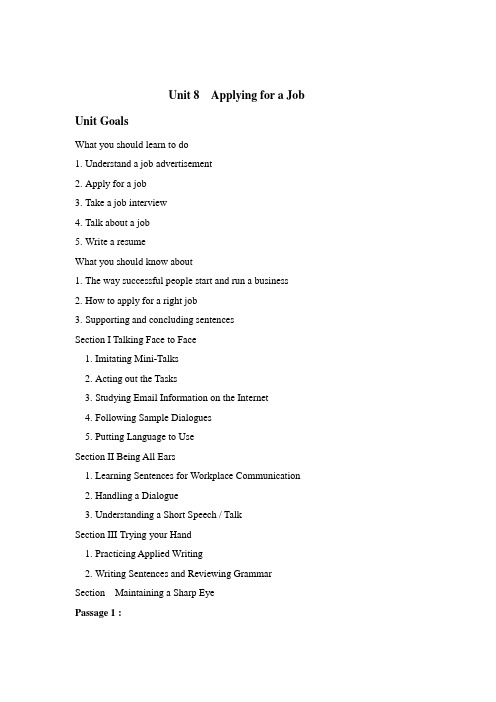
Unit 8 Applying for a Job Unit GoalsWhat you should learn to do1.Understand a job advertisement2.Apply for a job3.Take a job interview4.Talk about a job5.Write a resumeWhat you should know about1.The way successful people start and run a business2.How to apply for a right job3.Supporting and concluding sentencesSection I Talking Face to Face1.Imitating Mini-Talks2.Acting out the Tasks3.Studying Email Information on the Internet4.Following Sample Dialogues5.Putting Language to UseSection II Being All Ears1.Learning Sentences for Workplace Communication2.Handling a Dialogue3.Understanding a Short Speech / TalkSection III Trying your Hand1.Practicing Applied Writing2.Writing Sentences and Reviewing Grammar Section Maintaining a Sharp EyePassage 1 :Text Applying for a New BossWhen I went off to college, I got one piece of advice from my father: “It doesn’t matter what courses you take, just find the great professors.”Sure enough, I soon discovered that all kinds of subjects were interesting to me as long as good teachers presented them. In Professor Weinstein’s class, I could hear the tumbrels rolling through the streets of Paris during the French Revolution. And going back further, I can still recall things about the stars that I should have long ago forgotten if not for mysecond-grade teacher, Miss Scorchiotti. To me, a great teacher is one who performs a subject in a way that makes it come alive.A great boss does the same. They turn the day-to-day uninteresting jobs into a learning experience. They convince you that you and what you are doing actually matter. They give you confidence, which makes you more willing to ask a question, or assume responsibility, or even suggest a change in some age-old company process. In short, a great boss knows how to teach.So my advice to anyone bound for the job market in the coming years and to anyone looking for a different work experience is: Don’t interview for the right job. Interview for the right boss. Not a best person, but someone who is willing and able to help you grow professionally.What are some signs of the wrong boss? Well, anyone who:●is surrounded by the same team year after year. If you’re such a good teacher, why aren’t these people moving on and getting promoted?●is short of a sense of humor. Life is short. Work is hard. Let’s lighten up when facing something difficult.●loves typing. Hates talking. Why are you emailing me when I sit across the hall?Who are the best bosses I ever had? Angela, my first boss out of college, was very clever and outspoken. She ruffled feathers around the company but was eager to letme in on what she thought and why.My boss Tom used to say: “You can sleep when you’re dead.”Working for Tom was just a bit exhausting. But he was also unbelievably straightforward, and quick to ask advice and give it. We often had different opinions, yet our discussions helped both of us learn more about what we were trying to perform. A great boss both gives respect and earns it.And how do you know when you’ve found the right boss? Be yourself with them and see if the self they are with you is someone you want to learn from for a couple of years. If that person is dull or dogmatic in an interview, guess what they’re going to be like Monday through Friday? Interviewees are on their best behavior in that setting, but so are interviewers. You don’t like what you see? The power is yours. Go out and interview another boss.Language Points1 Explanation of Difficult Sentences1. (Para. 1) And going back further, I can still recall things about the stars that I should have long ago forgotten if not for my second-grade teacher, Miss Scorchiotti ... Analysis: This is a complex sentence. That introduces a relative clause to modify the stars, followed by an if-clause of condition. Attention should be paid to the subjunctive mood used here: should have forgotten, ... with the latter part being an elliptical clause which can be assumed to be if it were not for ...Translation: 再早些,我仍然记得有关星体的知识,若不是由于我二年级的斯高奇奥迪老师,我早就将其忘光了。
实用综合教程(第二版)外教社-第1册教案
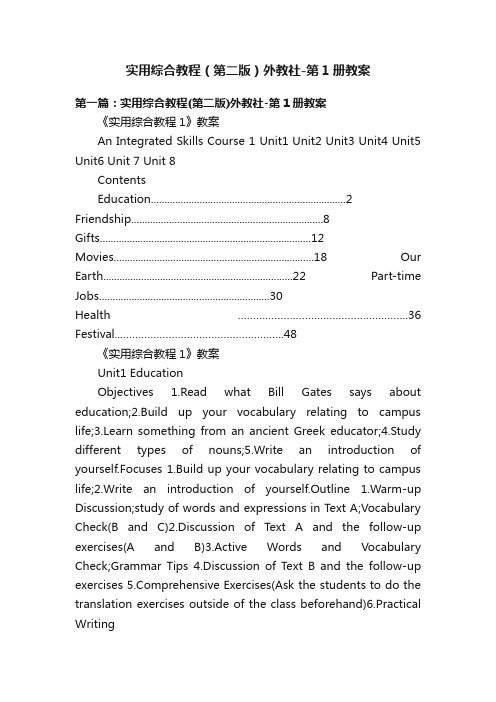
实用综合教程(第二版)外教社-第1册教案第一篇:实用综合教程(第二版)外教社-第1册教案《实用综合教程1》教案An Integrated Skills Course 1 Unit1 Unit2 Unit3 Unit4 Unit5 Unit6 Unit 7 Unit 8ContentsEducation (2)Friendship (8)Gifts (12)Movies..........................................................................18 Our Earth......................................................................22 Part-time Jobs (30)Health (36)Festival (48)《实用综合教程1》教案Unit1 EducationObjectives 1.Read what Bill Gates says about education;2.Build up your vocabulary relating to campus life;3.Learn something from an ancient Greek educator;4.Study different types of nouns;5.Write an introduction of yourself.Focuses 1.Build up your vocabulary relating to campus life;2.Write an introduction of yourself.Outline 1.Warm-up Discussion;study of words and expressions in Text A;Vocabulary Check(B and C)2.Discussion of Text A and the follow-up exercises(A and B)3.Active Words and Vocabulary Check;Grammar Tips 4.Discussion of Text B and the follow-up exercises prehensive Exercises(Ask the students to do the translation exercises outside of the class beforehand)6.Practical WritingProcedures: Classroom Activities I.Warm-up discussion Question: Do you know anything about Bill Gates such as his life and his educational background? Hint 1)birthday and birthplace: October 28, 1995;Seattle, Washington 2)educational background: Harvard University(education not completed)3)career: chairmen and chief software architect of Microsoft, the word‘s largest and most profitable software company.4)main events in his life:a.beginning programming computers at age 13;b.developing a version of the programming language BASIC for the first microcomputer in Harvard;c.founding Microsoft Corporation in 1975 at the age of 19II.Vocabulary in Text A cation n.教育e.g.Children in poor areas receive free cate v.教育;教导educated adj.受教育的 e.g.a well-educated man educator n.教育家,教育者 2.count v.派用场,点数《实用综合教程1》教案e.g.1)Every seconds counts.2)What counts more is whether you have tried your best.3)to count from 1 to 1004)Count these apples.3.advantage n.有利条件,好处;优点,优势e.g.This product has many advantages.advantageous adj.有利的,有益的,便利的 e.g.It is highly advantageous to us.Phrase: take advantage of 很好的使用;利用e.g.take advantage of all educational opportunitiesAntonym: disadvantage n.不利;不利条件e.g.His bad health is a great disadvantage to him when he looks for work.4.lifetime n.一生,终生e.g.1)a lifetime guarantee2)lifetime membership3)In my father‘s lifetime there have been many changes inthe village.5.part-time adj.& adv.兼职的(地)e.g.1)a part-time job2)He works part-time.full-time adj.全职的 e.g.a full-time housewife 6.programmer n.程序师,编程员program v.编制程序e.g.Please program the computer to do the job instead of doing it manually(手工操作).7.discourage vt.不鼓励;使泄气,使失去信心e.g.His parents discouraged him from joining the air force.discouraged adj.泄气的,失去信心的discouraging adj.使人泄气的,使人失去信心的e.g.1)If you meet difficulty in your study, don‘t be discouraged.2)It is discouraging that I didn‘t know how to solve the problem.Antonym: encourage vt.鼓励e.g.I encouraged her to work hard and to try to pass the examinations.courage n.勇敢,勇气e.g.David showed great courage when he saved the child from the burning house.8.diploma n.文凭,毕业证书e.g.a college diplomadiplomatic adj.外交的,从事外交的e.g.Julia joined the diplomatic service after her graduation from university.9.project n.项目,课题e.g.1)an impossible project2)The professor is directing a research project.Synonym: plan10.highly adv.高度地;非常e.g.1)a highly interesting story《实用综合教程1》教案2)a highly paid jobPhrase: speak/ think highly of 赞扬,对…给予很高评价e.g.The leader speaks / thinks highly of our work.11.focus v.(使)集中;(使)聚焦e.g.1)to focus(one‘s mind)in work2)All eyes focused on the speaker.focus n.(兴趣活动等的)中心,焦点e.g.Because of his strange clothes, he immediately became the focus of attention when he entered the office.12.range n.范围e.g.You have a wide range of choices.range vi.在某范围内变化e.g.The temperature ranges from 10 to 20 degrees.13.attend v.参加,出席e.g.attend schoolattend a lectureattendance n.出席,到场 14.automatically adv.自动地e.g.the machine operates automatically.automatic adj.自动的e.g.We have an automatic washing machine.15.drop out of 退学,不参与,退出e.g.1)He dropped out of school at the age of 10 because his family was too poor to afford the tuition.2)She decided to drop out of the competition because it was not fire.16.chance of a lifetime 千载难逢的良机,一生中唯一的机会e.g.It‘s the chance of a lifetime.You will regret it the rest of your life if you don‘t take it.17.try out 试验,考验e.g.She bought a cookbook and tried out a few new recipes.18.in short 简而言之,总之e.g.In short, you should study hard for a better future.Synonym: in brief/ to sum up/ all in all/ in conclusion nguage Points in Text A1.They want to know what to study, or whether it‟s Ok to drop out of college since that‟s what I did.what to study: This is a wh-word + infinitive structure used as the object, which can be changed into an object clause.Wh-word + infinitive structure canbe used as a subject, an object, or an appositive clause(同位语从句),for example: 1)How to improve their English is often discussed among the students.2)We haven‘t decided when to visit t he place.3)You haven‘t answered my question about where to get these books.it‟s Ok to drop out of college: Here ―it‖is used as a formal subject, and the actual subject is the infinitive structure ―to drop out of college‖.The general pattern is ―It is + adj.+(for/ of + sb.)to《实用综合教程1》教案do sth.‖ More examples: 1)It was very thoughtful of her to come to see me when I was ill.2)It‘s easy for me to see through his trick.that‟s what I did: ―what I did‖here is a predictive clause(表语从句)introduced by ―what‖.It i s always structured in the form of ―subject + be/ look/ remain/ seem + predictive clause‖ and can be introduced by such words as ―that‖(always omitted), and other wh-words, for example: 1)It seems(that)it is going to rain.2)This is why I refused to attend the meeting.2.As I ‟ve said before, nobody should drop out of college unless they believe they face the chance of a lifetime.As I‟ve said before: This is a non-restrictive relative clause(非限制性关系从句)introduced by ―as‖(正如…的那样), which can be placed at the beginning or at the end of the sentence.More examples: 1)As people expected, she was admitted to Beijing University.2)Hundreds of people were killed in the earthquake, as I have learned from the newspaper.unless: is a conjunction for an adverbial clause of condition(条件状语从句), which equals ―if…not…‖(除非).e.g.I won‘t leave unless the rain stops.3.In my company‟s early years, we have a bright part-time programmer who planned to drop out of high school to work.planned to: intend to do sth.计划、打算做某事e.g.I plan to make a trip to Beijing during the summer vocation.who planned to …work: a restrictive relative clause introduced by ―who‖ since its antecedent is a person and serves as the subject in the clause.The relative pronoun ―that‖ can be used here too.More examples: 1)The young man who sits there quietly is my brother.2)I don‘t like people that pry into others‘ private business.4.Having a diploma certainly helps somebody who is looking to us for a job.look to sb./ sth.: to depend on sb.or sth.for help or advice 指望,依赖e.g.We look to you for support.5.High school and college offer you the best chance to learn many things and to do projects with others that teach you about team spirit.that teach you about team spirit: This is a restrictive relative clause introduced by ―that‖, whose antecedent acts as the subject of the clause.Actually the relative clause introduced by ―that‖ can be used to modify both the person or the thing, and the roll of ―that‖ can be either the subject or the object.e.g.He was the only one that I knew t here.I haven‘t been to the place that you have mentioned.6.In high school there was a time when I was highly focused on writing software, but for most of my high school years I had many interests.when …software: This is a relative clause introduced by the relative adverb ―when‖, which acts as the adverbial of time in the clause.e.g.1)There was a time when I completely lost my self-confidence.2)I will never forget those days when we were together.《实用综合教程1》教案7.For me, classroom is not the only place where you can learn.where you can learn: This is a restrictive relative clause introduced by the relative adverb ―where‖, which is used as the adverbial of place in the clause.e.g.1)Do you still remember therestaurant where we had dinner last night?2)This is the place where he stayed his whole life.8.In short, it‟s a real mistake not to take the chance to study a wide range of subjects and to learn to work with other people because education does count.it‟s a real mistake not to take the chance: This is an example of a negative infinitive structure, where ―not‖is placed before an infinitive.e.g.1)We are asked not to speak loudly in class.2)It is a good idea not to go out on such a rainy day.IV.Focus on Grammar 名词(Noun)一、名词的概念表示人、事物或抽象概念的词叫做名词。
大学实用英语综合教程教案

教学目标:1. 学生能够掌握与旅行相关的英语词汇和短语。
2. 学生能够运用所学知识进行旅行场景下的对话。
3. 培养学生的听说能力,提高学生的英语交际能力。
教学重点:1. 旅行相关词汇和短语:airport, hotel, travel agency, guidebook, etc.2. 旅行场景下的对话:询问信息、表达需求、描述经历等。
教学难点:1. 旅行场景下的复杂对话。
2. 词汇和短语的灵活运用。
教学准备:1. 教材:《大学实用英语综合教程》2. 多媒体课件3. 旅游景点图片、视频等教学素材4. 旅行场景对话练习教学过程:一、导入1. 教师展示旅游景点图片,引导学生谈论旅行的话题。
2. 学生分享自己的旅行经历,激发学习兴趣。
二、词汇学习1. 教师板书旅行相关词汇,如:airport, hotel, travel agency, guidebook等。
2. 学生跟读并记忆词汇,教师适时纠正发音。
3. 教师用例句展示词汇用法,让学生理解词汇含义。
三、对话练习1. 教师播放旅行场景对话录音,让学生跟读并模仿。
2. 学生分组进行角色扮演,练习旅行场景下的对话。
3. 教师巡视指导,纠正学生发音和语法错误。
四、语法讲解1. 教师讲解旅行场景下的常用语法结构,如:一般现在时、一般过去时、一般将来时等。
2. 学生练习语法填空,巩固所学知识。
五、综合练习1. 教师出示旅游景点图片,让学生用所学词汇和短语描述图片。
2. 学生分组进行情景对话,模拟旅行过程中的场景。
六、总结与作业1. 教师总结本节课所学内容,强调重点和难点。
2. 学生自评和互评,找出自己的不足。
3. 布置作业:背诵旅行相关词汇和短语,准备下一节课的角色扮演。
教学反思:本节课通过词汇学习、对话练习、语法讲解和综合练习等环节,让学生掌握了与旅行相关的英语知识和技能。
在教学过程中,教师注重激发学生的学习兴趣,引导学生积极参与课堂活动。
同时,教师注重纠正学生的发音和语法错误,提高学生的英语交际能力。
实用综合教程教案Unit
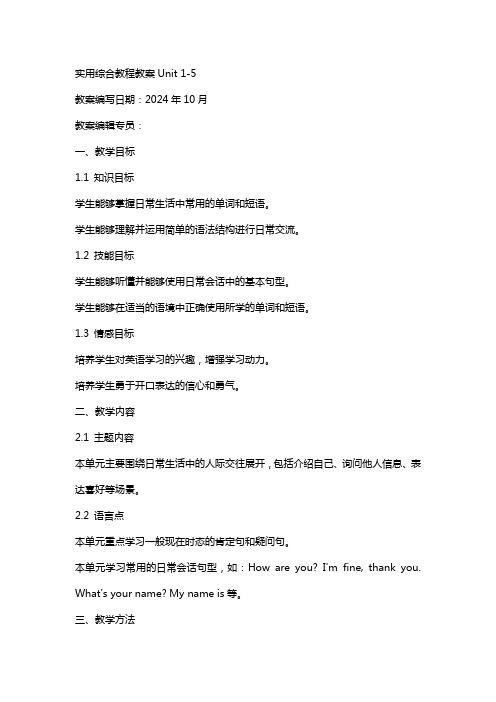
实用综合教程教案Unit 1-5教案编写日期:2024年10月教案编辑专员:一、教学目标1.1 知识目标学生能够掌握日常生活中常用的单词和短语。
学生能够理解并运用简单的语法结构进行日常交流。
1.2 技能目标学生能够听懂并能够使用日常会话中的基本句型。
学生能够在适当的语境中正确使用所学的单词和短语。
1.3 情感目标培养学生对英语学习的兴趣,增强学习动力。
培养学生勇于开口表达的信心和勇气。
二、教学内容2.1 主题内容本单元主要围绕日常生活中的人际交往展开,包括介绍自己、询问他人信息、表达喜好等场景。
2.2 语言点本单元重点学习一般现在时态的肯定句和疑问句。
本单元学习常用的日常会话句型,如:How are you? I'm fine, thank you. What's your name? My name is等。
三、教学方法3.1 情境教学法通过设置各种生活情境,让学生在实际语境中学习和使用英语。
3.2 交际法鼓励学生进行角色扮演,进行实际的语言交流。
3.3 任务型教学法通过完成各种小组任务,培养学生的合作精神和语言运用能力。
四、教学步骤4.1 热身活动(5分钟)教师与学生进行简单的英语问候,营造轻松的课堂氛围。
4.2 新课导入(10分钟)教师通过图片、实物等展示本节课的主题,引入新词汇和句型。
4.3 课堂讲解(15分钟)教师讲解本节课的重点词汇和句型,让学生进行实际操作练习。
4.4 小组活动(15分钟)学生分组进行角色扮演,运用所学词汇和句型进行实际交流。
4.5 总结与作业布置(5分钟)教师对本节课的内容进行总结,布置相关作业,巩固所学知识。
五、教学评价5.1 课堂参与度观察学生在课堂上的积极参与程度,以及对课堂活动的兴趣。
5.2 语言运用能力评估学生在角色扮演等实际交流活动中的语言运用能力。
5.3 作业完成情况检查学生作业的完成质量,以巩固所学知识。
六、教学资源6.1 教材:实用综合教程教材6.2 辅助材料:多媒体课件、图片、实物等6.3 教学工具:投影仪、计算机、黑板等七、教学评估7.1 形成性评估教师在教学过程中观察学生的学习情况,及时进行反馈和指导。
21世纪大学实用英语综合教程U版第3册教学设计
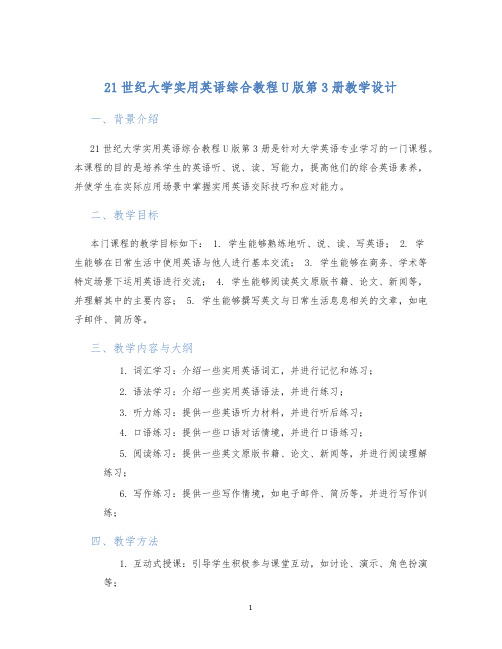
21世纪大学实用英语综合教程U版第3册教学设计一、背景介绍21世纪大学实用英语综合教程U版第3册是针对大学英语专业学习的一门课程。
本课程的目的是培养学生的英语听、说、读、写能力,提高他们的综合英语素养,并使学生在实际应用场景中掌握实用英语交际技巧和应对能力。
二、教学目标本门课程的教学目标如下: 1. 学生能够熟练地听、说、读、写英语; 2. 学生能够在日常生活中使用英语与他人进行基本交流; 3. 学生能够在商务、学术等特定场景下运用英语进行交流; 4. 学生能够阅读英文原版书籍、论文、新闻等,并理解其中的主要内容; 5. 学生能够撰写英文与日常生活息息相关的文章,如电子邮件、简历等。
三、教学内容与大纲1.词汇学习:介绍一些实用英语词汇,并进行记忆和练习;2.语法学习:介绍一些实用英语语法,并进行练习;3.听力练习:提供一些英语听力材料,并进行听后练习;4.口语练习:提供一些口语对话情境,并进行口语练习;5.阅读练习:提供一些英文原版书籍、论文、新闻等,并进行阅读理解练习;6.写作练习:提供一些写作情境,如电子邮件、简历等,并进行写作训练;四、教学方法1.互动式授课:引导学生积极参与课堂互动,如讨论、演示、角色扮演等;2.多媒体辅助:使用多媒体设备,如投影仪、电子白板、PPT等,辅助教学;3.分组合作:将学生分成小组合作,进行讨论、演示等活动;4.学生自主学习:鼓励学生进行自主学习,如阅读英语原版书籍、论文等。
五、教学评估1.期末考试:考查学生对于本课程内容的掌握情况;2.日常表现:考查学生的课堂表现,如互动参与、日常作业等。
六、教学效果评估1.教学成果反馈:在课程结束后,采取问卷调查、个别面谈等方式,获取学生对于本门课程的反馈;2.教学质量评估:定期组织专家对本门课程进行评估,以提升教学质量。
七、总结与展望21世纪大学实用英语综合教程U版第3册的设计旨在培养学生的英语综合交际能力,通过多种教学方法、多样化的教学内容和评估方式,达到培养学生英语能力的目的。
实用英语综合教程第三册教案
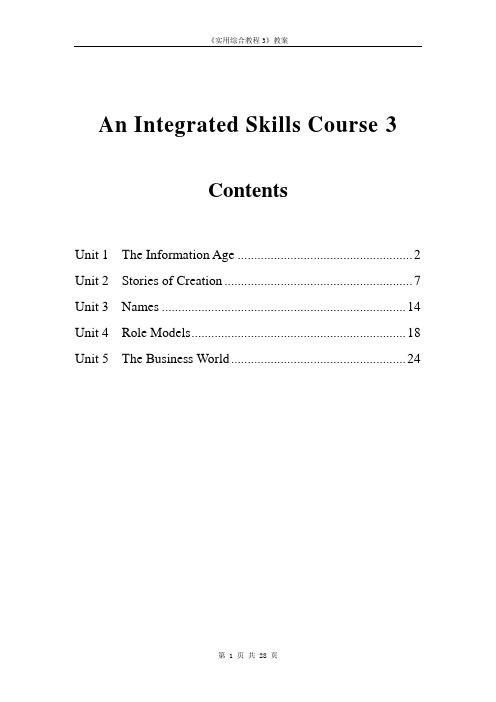
An Integrated Skills Course 3ContentsUnit 1 The Information Age (2)Unit 2 Stories of Creation (7)Unit 3 Names (14)Unit 4 Role Models (18)Unit 5 The Business World (24)Unit 1 The Information AgeObjectives:1.Enlarge your vocabulary related to computers and the internet.2.Get some tips about the use of direct speech and indirect speech.3.Practice writing a resume.Procedures:The first period1.Teaching content: study of words and expressions, vocabulary check (B and C)2.Procedures:Step 1--- study of words and expressions in text A;Warm-up Discussion(10 minutes):What can we do on the Internet?(The students will probably have trouble with English expressions related to the Internet. The teacher may allow the students to answer this question in Chinese, and then give the students key terms in English and ask them to express their ideas again in English. Some useful words and expressions can be found in the books. Here are some new words and expressions.Introduce new words on board: (20 minutes)instant:instant milk powder; instant noodlePhrase: the instant(that)… 一…就…I told you the news the instant (that)I heard it.message:Will you take this message to her?Phrase: get the message 明白,领会She said it was getting late. I got the message and left.formal:She invited us to attend a formal dance.Antonym: informalYou can wear casual clothes because this is an informal party.typical:a typical teacher/businessperson/officialbill:a phone /electricity/water/gas billI can’t pay for the books now. Will you bill me(for them)later?mean:He was very mean to me.She is too mean to make a donation.The mean of 7,9 and 14 is 10.join:He joined the army last year.This road joins the two villages.Phrase: join in 参加They all joined in singing the Christmas carols.connect:Will you connect this wire to the television?The two cities are connected by a railway.right away:I want it printed out right away, please.keep in touch:let’s keep in touch.We have been keeping in touch with each other after graduation.keep up with:She likes to keep up with the latest fashions.get in the way of:I’m afraid your bike is getting in the way of my car.at the expense of”He built up a successful business at the expense of his health.Step 2—Practice: Vocabulary Check(B and C)<Page 8> (15 minutes)1)Give students 5 minutes to finish B and C by themselves, then check the answer.You may invite some students to read their answers, and ask them to translate C into Chinese)2)The answer of C:coversational/form/connected/instant/worried/abbreviated/improvement/monitors The second period1.Teaching content: Discussion and Comprehensive of Text A2.Procedures:Step 1--- Warm up(10 minutes)(invite some students to explain the meaning of the difficult sentences of the text A in English or in Chinese, teacher may give them some hints.)Step2--- Language Points(20 minutes)1)Confused: This is an elliptical sentence. An elliptical sentence often appears inspeaking or informal writing when the context makes the meaning clear. More examples:Interesting? You won’t find it interesting if you know what’s going to happen next.2)Your dictionary won’t help you, but our word list will: You can’t find these wordsin your dictionary, but you can find them in our word list.but our word list will: This is an elliptical clause with repetitious elements omitted. The complete clause should be “but our list will help you”.3)I can express my feelings more easily with IM, without the guilty feeling ofstaying in face-to-face: I can express my feelings more easily with instantmessaging because I do not have a bad feeling when I employ angry words online while I will if I use them directly in front of another person.4)Many parents and teachers think children’s in stant messaging habits are takingtheir attention away from more important things: many parents and teachers think that children should pay attention to more important things(such as their studies)but children with instant messaging habits are not doing so because they are too absorbed in instant messaging.5)Staying connected is fine, but an online friendship with a stranger is not: it isgood for children to keep in touch with friends, but it is not good for them to make friends with a stranger on the Internet.6)Many parents monitor instant messaging, either by limiting tome online or bykeeping the computer in a common area: many parents keep close watch on their children’s instant messages. They do so by putting a limit on the time that the children could spend online or by keeping the computer in an area where all family members can go and take a look.7)…i nstant messaging isn’t getting in the way of real life:Instant messaging doesn’t affect real life.8)Even parents and teachers who don’t like IM have to adm it that at least childrenare writing: Even though some parents and teachers don’t like IM, they have to admit the fact that at least children are writing when they use instant messaging.9)Is it at expense of proper English? Does the use of instant messaging affect theproper use of the English language among children?Step3--- practice(15 minutes)Pair work(page 5-6)(Divide the students into groups. Appoint a leader for each group. Encourage the students to take turns speaking in the discussion. Invite some students to answer the questions )Here are some answers:1)Sixty percent of children online.2)Instant messages are typed so fast that users don’t slow down to change intocapital letters, add punctuation, or write complete words.3)No. Sometimes children use it to show angry feelings.4)Monitor instant messaging either by limiting time online or by keeping thecomputer in a common area.5)Children would do nothing but play video games or watch television.V ocabulary Check A(Page 8)The third periodTeaching content: Grammar tips and Text BProcedures:Step 1--- Grammar: Direct Speech and Indirect Speech(Write some direct/indirect speech on the board. Ask students to change it. Here are some examples:) (Time:10 minutes)1)“language has always changed, and it alway s will,” says Baron.Baron says that language has always changed and that it always will.2)They said, “We will spend next weekend at home.”They said that they would spend the next weekend at home.3)“Does he really mean it?” he asked.He asked whether/if he really meant it.4)“Why didn’t you stop him?” he asked.He asked me why I hadn’t stopped him.Explanation of grammar: (15 minutes)人称变化:主语为第一人称的直接引语,变间接引语时,人称要做相应调整,即:第一人称变第三人称,第二人称变第一人称时态变化:直接引语变间接引语时,间接引语的时态要与主句的时态一致。
实用综合教程3(第二版) 电子教案Unit1

《实用综合教程》(第二版)第3册电子教案
Unit 1 The Information Age
Listening
Speaking
II. Speaking Discuss with your partner the advantages and possible problems for young people using the Internet and how we could keep the problems under control. In the space provided below, list the advantages, problems, and solutions. Get ready to present your major points to the class. 1. Advantages: _______________________ 2. Possible problems: __________________ 3. Possible solutions: ___________________
《实用综合教程》(第二版)第3册电子教案
Unit 1 The Information Age
Background Information
Discussion
An individual who has Internet access can: ● communicate directly with anyone else, ● make information available to others, ● find information provided by others, ● or sell products with a minimum overhead cost.
实用英语综合教程第2册教案
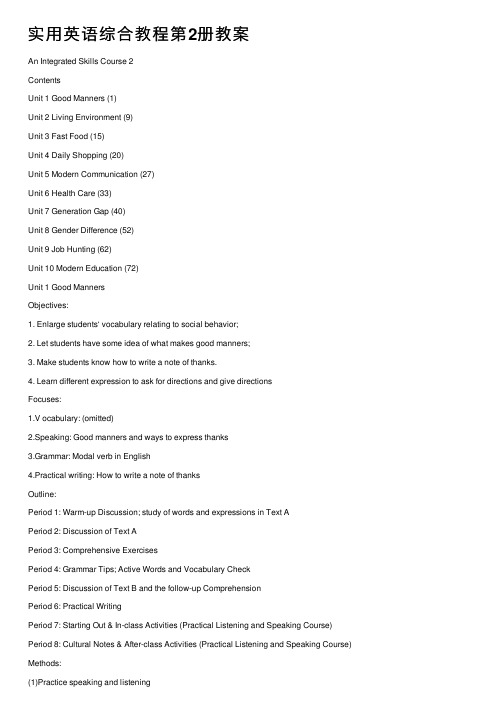
实⽤英语综合教程第2册教案An Integrated Skills Course 2ContentsUnit 1 Good Manners (1)Unit 2 Living Environment (9)Unit 3 Fast Food (15)Unit 4 Daily Shopping (20)Unit 5 Modern Communication (27)Unit 6 Health Care (33)Unit 7 Generation Gap (40)Unit 8 Gender Difference (52)Unit 9 Job Hunting (62)Unit 10 Modern Education (72)Unit 1 Good MannersObjectives:1. Enlarge students‘ vocabulary relating to social behavior;2. Let students have some idea of what makes good manners;3. Make students know how to write a note of thanks.4. Learn different expression to ask for directions and give directionsFocuses:1.V ocabulary: (omitted)2.Speaking: Good manners and ways to express thanks3.Grammar: Modal verb in English4.Practical writing: How to write a note of thanksOutline:Period 1: Warm-up Discussion; study of words and expressions in Text APeriod 2: Discussion of Text APeriod 3: Comprehensive ExercisesPeriod 4: Grammar Tips; Active Words and Vocabulary CheckPeriod 5: Discussion of Text B and the follow-up ComprehensionPeriod 6: Practical WritingPeriod 7: Starting Out & In-class Activities (Practical Listening and Speaking Course) Period 8: Cultural Notes & After-class Activities (Practical Listening and Speaking Course) Methods:(1)Practice speaking and listening(2)Discussion(3)Presentation and role play(4) ExercisesTeaching ProceduresPeriod 1:Step 1. Warm-up Discussion (5 minutes)Ask the students to talk about manners and why good manners are important in our life.Question:Do you think good manners are important in our life? Why?Hint: Good manners are important because (1) they help us make friends; (2) they show that we are well-educated; (3) they help to get things done.Step 2. Background Information (10 minutes)Tell something about Cultural differences between Chinese and Americans.Step 3. Vocabulary in Text A (20 minutes)Ask Ss to read new words and expressions by themselves and then read the new words together. Explain the important points.1. old-fashioned adj.过时的,⽼式的,守旧的Phrase: (1) out of fashion 过时(2) in fashion 时尚的,流⾏的e.g. Is it the fashion to wear short skirts? Yes, short skirts are in fashion.2. courtesy n.礼貌,谦恭;许可courteous 有礼貌的,谦恭的e.g. It was courteous of him to offer to help the old lady cross the street.Antonym: discourtesySynonym: politeness3. historically adv.在历史上,从历史⾓度看historical 历史上的,有关历史的historical lessons 历史教训historic 有历史意义的,历史上有名的 a historic meeting 历史性会议historian 历史学家,从事历史研究的⼈4. respect n.尊敬,敬佩;⽅⾯vt.尊敬respectful adj.恭敬的,尊敬的,有礼貌的respectable adj.可敬的,值得尊敬的respective adj.分别的,各⾃的5. concern vt.涉及,牵涉;使担⼼n.关⼼,担⼼;关⼼的事Phrase: (1) as / so far as…is concerned就……⽽⾔(2) (be) concerned about 关⼼,操⼼(3) (be) concerned with 有关,涉及concerning prep.关于,涉及e.g. There was a heated discussion concerning the value of the book.concerned adj.关切的,焦虑的;相关的,牵涉到的e.g. Everyone was concerned about your health.6. sense n. 感觉,官能Phrase: (1) come to one‘s sense 恢复理智;醒悟过来;苏醒过来(2) in a sense 从某种意义上说(3) make sense 讲得通,有意义(4) make sense of 理解,弄懂7. tough adj.凶悍的,粗暴的;艰苦的;坚韧的e.g. (1) a tough winter⼀个严冬(2) the toughest questions最困难的问题toughness n.韧性,坚韧;凶悍,粗暴8. mercy n.怜悯,宽恕,仁慈merciful adj. 仁慈的,慈悲的merciless adj. 毫⽆同情⼼的,冷酷⽆情的Phrase: at the mercy of 任由……摆布,完全受……⽀配e.g. They were lost at sea, at the mercy of wind and weather.9. be supposed to 应该e.g. We are not supposed to play football on Sundays.10. come up 发⽣e.g. The question never came up.Step 4. Vocabulary Check B &C (10 minutes)Ask the students to finish the exercise, vocabulary check (part B and C). Then check the answers.Period 2:Step 1. Language Points in Text A (30 minutes)Explain the language points to Ss and analyze the structure of the passage. Pay more attention to longer sentences in Text A and try to make Ss understand.1. One of the good things for men in women?s liberation is that men no longer have to pay women the old-fashioned courtesies:One way that men benefit from women‘s liberation is that they no longer need to be polite to women in the old ways, since the old rules of politeness are no longer popular.pay sb. courtesy: be polite to sb.2. According to an article on the changes on manners, a perfectly able woman no longer has to act helplessly in public as if she were a modal: Based on an article about changes in manners, a fully able woman does not have to behave in public as she were unable to take care of herself. as if / as though: introducing a subjunctive clausee.g. (1) He behaved as if nothing had happened(2) It seemed as though the meeting would never end.3. A man should walk where he wants to. So should a woman: A man should walk where he wants to walk; and a woman should also walk where she wants to walk.So: When it is put at the beginning of the sentence, the sentence should be inverted. So cannot be used with negation. We use neither.e.g. (1) Time have changed and so have we.(2) He prefers the first version. So do I.Comparison:So: used to agree that sth. is true, especially when you are surprised.e.g. There‘s yet another doll inside. —So there is.4. Over the years, out of sense of respect, I imagine, I have refused to trouble women with outdated courtesies: I think I have been consciously avoiding treating women with old-fashioned courtesies all these years, simply because I respect them.I imagine: This is a parenthetical remark (插⼊语), often inserted in the middle or at the end of the sen tence. Other similar expressions include ―I think (suppose, hope, guess, believe, wonder)‖, ―I tell you‖, ―I‘m afraid‖, ―I‘m sure‖, ―you see‖,―you know‖, ―that is‖, etc.trouble… with: This structure is often used in polite requests.e.g. I don‘t want to trouble the doctor with such a small problem.5. It is usually easier to follow rules of social behavior than to depend on one?s own taste: Just following rules of social behavior is often easier than acting according to one‘s own preference. follow a rule: keep or observe a rulee.g. How can the US government force others to follow rules while it doesn‘t always follow then itself?6. This is a courtesy I insist on as the stronger sex, out of love and respect: As a man, I always believe that men should treat women with this kind of politeness, because this shows love and respect for them.the stronger sex:This refers to men. For women, some people used to call them ―the weaker sex‖, ―the fairer sex‖, or ―the soft sex‖, which are now outdated.7. In times like these, there might be tough attackers hidden about.―Hidden about‖ is a past participle phrase used as an attribute to modify ―attackers‖. We can also say ―attackers who were hidden about‖.Step 2. Comprehension of Text A (15 minutes)Give students 5 minutes to go through the text, ask them to finish the exercise then check the answers.Period 3:Step 1. Comprehensive Exercises (45 minutes)Ask the students to finish the exercise then check the answers.Period 4:Step 1. Active words (20 minutes)Ask the students to pay more attention to the function of the active words and then finish the relative exercises.Step 2. Grammar Tips情态动词( Modal Verbs) (20 minutes)First, ask Ss to preview the explanation and then give further study of the grammar tip. Do theexercises to check out whether Ss know the grammar well.情态动词的定义情态动词有⼀定的词义,表⽰说话⼈的情绪、态度或语⽓,不能单独作谓语,只能和其他动词原形构成谓语。
新编实用英语综合教程电子使用说明PPT学习教案

For Fun
该部分旨在活跃课堂气氛,缓解 学习的疲劳,包括谜语、绕口令 、脑筋急转弯、笑话等。
第16页/共20页
使用说明
一、图标说明 点击此图标返回上级菜单 点击此图标返回课文中此
句或此词所 点击在此原图位标会置播放相应的声音。 点击此图标观看下一页
第17页/共20页
二、运行环境:
为了保证幻灯片播放时的效果,请在配 置较高的计算机上使用本课件,推荐配 置PⅢ800MHz/128MB或以上。
第16页共20页一图标说明一图标说明点击此图标返回上级菜单点击此图标返回上级菜单点击此图标返回课文中此点击此图标返回课文中此在原位置在原位置点击此图标观看下一页点击此图标观看下一页点击此图标会播放相应的声音
新编实用英语综合教程电子使用说明
会计学
1
创意说明
本课件旨在为使用本教材的教师提供一个 好帮手。因此,在制作过程中,我们始终坚持 从教师的角度出发,以方便教师使用为原则, 以适应不同的教学要求为目的, 努力开发一套 多层次、多角度、全方位的教学辅助工具。
第14页/共20页
Exercises
该部分包 括课后 练习的 Comprehension Vocabulary、S tructure和Translation。 练习部 分有一 个分级 菜单与 各题链 接,教 师可进 行选择 。
Test Yourself
该部分包括以下3项内容: 1. Dictation:从A篇或B篇选择5句话 听写,既考查听力又考查拼写。 2. Blank Filling: 选词填空、给首字母 填空、填派生词或介词/副词填空,考查 词汇的掌握情况。 3. Multiple Choice: 针对本单元的目标 词汇或与四级考试相关的语法设定考点 ,巩固所学内容的同时也锻炼解题技巧 。 第15页/共20页
- 1、下载文档前请自行甄别文档内容的完整性,平台不提供额外的编辑、内容补充、找答案等附加服务。
- 2、"仅部分预览"的文档,不可在线预览部分如存在完整性等问题,可反馈申请退款(可完整预览的文档不适用该条件!)。
- 3、如文档侵犯您的权益,请联系客服反馈,我们会尽快为您处理(人工客服工作时间:9:00-18:30)。
实用英语综合教程U n i p p l i y i n g f o r b教案 Last revision date: 13 December 2020.U n i t8A p p l y i n g f o r a J o bUnit GoalsWhat you should learn to do1.Understand a job advertisement2.Apply for a job3.Take a job interview4.Talk about a job5.Write a resumeWhat you should know about1.The way successful people start and run a business2.How to apply for a right job3.Supporting and concluding sentencesSection I Talking Face to Face1.Imitating Mini-Talks2.Acting out the Tasks3.Studying Email Information on the Internet4.Following Sample Dialogues5.Putting Language to UseSection II Being All Ears1.Learning Sentences for Workplace Communication2.Handling a Dialogue3.Understanding a Short Speech / TalkSection III Trying your Hand1.Practicing Applied Writing2.Writing Sentences and Reviewing GrammarSection Maintaining a Sharp EyePassage 1 :Text Applying for a New BossWhen I went off to college, I got one piece of advice from my father: “It doesn’t matter what courses you take, just find the great professors.” Sure enough, I soon discovered that all kinds of subjects were interesting to me as long as good teachers presented them. In Professor Weinstein’s class, I could hear the tumbrels rolling through the streets of Paris during the French Revolution. And going back further, I can still recall things about the stars that I should have long ago forgotten if not for mysecond-grade teacher, Miss Scorchiotti. To me, a great teacher is one who performs a subject in a way that makes it come alive.A great boss does the same. They turn the day-to-day uninteresting jobsinto a learning experience. They convince you that you and what you are doing actually matter. They give you confidence, which makes you more willing to ask a question, or assume responsibility, or even suggest a change in some age-old company process. In short, a great boss knows how to teach.So my advice to anyone bound for the job market in the coming years and to anyone looking for a different work experience is: Don’t interview for the right job. Interview for the right boss. Not a best person, but someone who is willing and able to help you grow professionally.What are some signs of the wrong boss Well, anyone who:● is surrounded by the same team year after year. If you’re such a good teacher, why aren’t these people moving on and getting promoted?● is short of a sense of humor. Life is short. Work is hard. Let’s lighten up when facing something difficult.● loves typing. Hates talking. Why are you emailing me when I sit across the hall?Who are the best bosses I ever had Angela, my first boss out of college, was very clever and outspoken. She ruffled feathers around the company but was eager to let me in on what she thought and why.My boss Tom used to say: “You can sleep when you’re dead.” Working for Tom was just a bit exhausting. But he was also unbelievably straightforward, and quick to ask advice and give it. We often had different opinions, yet our discussions helped both of us learn more about what we were trying to perform.A great boss both gives respect and earns it.And how do you know when you’ve found the right bossBe yourself with them and see if the self they are with you is someone you want to learn from for a couple of years. If that person is dull or dogmatic in an interview, guess what they’re going to be like Monday through Friday Interviewees are on their best behavior in that setting, but so are interviewers. You don’t like what you seeThe power is yours. Go out and interview another boss.Language Points1 Explanation of Difficult Sentences1. (Para. 1) And going back further, I can still recall things about the stars that I should have long ago forgotten if not for my second-grade teacher, Miss Scorchiotti ...Analysis: This is a complex sentence. That introduces a relative clause to modify the stars, followed by an if-clause of condition. Attention should be paid to the subjunctive mood used here: should have forgotten, ... with the latter part being an elliptical clause which can be assumed to be if it were not for ...Translation: 再早些,我仍然记得有关星体的知识,若不是由于我二年级的斯高奇奥迪老师,我早就将其忘光了。
Example: If not for your help, we couldn’t have finished the experiment successfully.2. (Para. 5) She ruffled feathers around the company but was eager to let me in on what she thought and why.Analysis: Ruffle feathers is used here figuratively to mean become annoyed. Thephrase let sb. In on sth. means to allow to share or to know a secret.Translation: 她对公司上下指指点点,但却愿意让我了解她的想法和做事的原因。
